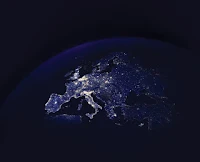More than 5,000 Organized Crime Groups (OCGs) operating on an international level are currently under investigation in the European Union (EU), Europol director Rob Wainwright said Thursday at the launch of the organization's Serious and Organized Crime Threat Assessment 2017 (SOCTA).
The number marks a significant increase since the first SOCTA was published by Europol in 2013, when 3,600 OCGs were under investigation in the EU.
"This increase is primarily a reflection of a much-improved intelligence picture. It is also an indication of shifts in criminal markets and the emergence of smaller, more interconnected groups and individual criminal entrepreneurs as part of a more enterprising criminal economy, especially in activities taking place online," Wainwright explained.
The SOCTA reports that EU states should focus on five key priorities -- cyber crime, the production, trafficking and distribution of illicit drugs, migrant smuggling, organized property crime and human trafficking.
"In addition, we recommend that European states focus on three cross-cutting crime threats: document fraud, money laundering, and online trade in illicit goods and services, which have a significant impact across the spectrum of serious and organized crime," said Wainwright.
According to the report's findings, for almost all types of organized crime, criminals are deploying and adapting technology with ever greater skill and to ever greater effect.
"This is now, perhaps, the greatest challenge facing law enforcement authorities around the world, including in the EU," warned Europol's chief.
"Organized crime can be a critical facilitator of terrorism and remains a key threat to our security," said Julian King, European Commissioner for the Security Union.
"The EU faces several complex threats, which are increasingly cross border and cross sector," King called on EU states to strengthen cooperation to fight this phenomenon.
The report stated that the criminal markets involving illicit drugs, human trafficking, and migrant smuggling attract the largest numbers of OCGs and continue to generate the greatest profits among the various criminal markets in the EU.
Emerging crime phenomena such as online trade in illicit goods and services may eclipse these markets in size and profits in the future.
[Xinhua/China]
10/3/17
The number marks a significant increase since the first SOCTA was published by Europol in 2013, when 3,600 OCGs were under investigation in the EU.
"This increase is primarily a reflection of a much-improved intelligence picture. It is also an indication of shifts in criminal markets and the emergence of smaller, more interconnected groups and individual criminal entrepreneurs as part of a more enterprising criminal economy, especially in activities taking place online," Wainwright explained.
The SOCTA reports that EU states should focus on five key priorities -- cyber crime, the production, trafficking and distribution of illicit drugs, migrant smuggling, organized property crime and human trafficking.
"In addition, we recommend that European states focus on three cross-cutting crime threats: document fraud, money laundering, and online trade in illicit goods and services, which have a significant impact across the spectrum of serious and organized crime," said Wainwright.
According to the report's findings, for almost all types of organized crime, criminals are deploying and adapting technology with ever greater skill and to ever greater effect.
"This is now, perhaps, the greatest challenge facing law enforcement authorities around the world, including in the EU," warned Europol's chief.
"Organized crime can be a critical facilitator of terrorism and remains a key threat to our security," said Julian King, European Commissioner for the Security Union.
"The EU faces several complex threats, which are increasingly cross border and cross sector," King called on EU states to strengthen cooperation to fight this phenomenon.
The report stated that the criminal markets involving illicit drugs, human trafficking, and migrant smuggling attract the largest numbers of OCGs and continue to generate the greatest profits among the various criminal markets in the EU.
Emerging crime phenomena such as online trade in illicit goods and services may eclipse these markets in size and profits in the future.
[Xinhua/China]
10/3/17

No comments:
Post a Comment
ethnologia news only